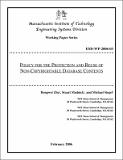| dc.description.abstract | With the increasing use of the Internet, many of us feel strongly about the free and unfettered exchange and use of information. But the actual situation is not that simple. After the European Union adopted the Database Directive to provide legal protection for non-copyrightable database contents, the U.S. has introduced six legislative proposals, all of which failed to become a law. One of the major difficulties of formulating a socially beneficial database law is in finding the right balance between protecting the incentives of creating publicly accessible databases (including semi-structured web sites) and preserving adequate access to factual data for value creating activities. We address the problem by developing an extended spatial competition model that explicitly considers the inefficiencies in policy administration. With the model, we can determine various conditions and the corresponding socially beneficial policy choices. The results show that, depending on the cost level of database creation, the degree of differentiation of the reuser database, and the efficiency of policy administration, the socially beneficial policy choice can be protecting a legal monopoly, encouraging competition via compulsory licensing, discouraging voluntary licensing, or even allowing free riding. The results provide useful insights to the formulation of a socially beneficial database protection policy. | en_US |

